模块1 Unit 3 Looking good, feeling good---Grammar and usage定语从句
文档属性
| 名称 | 模块1 Unit 3 Looking good, feeling good---Grammar and usage定语从句 | 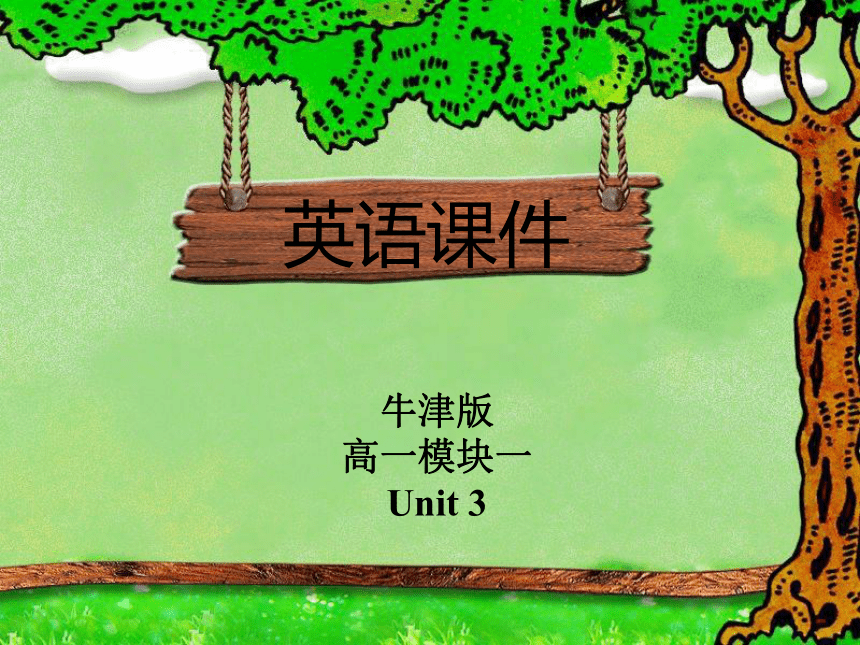 | |
| 格式 | zip | ||
| 文件大小 | 2.2MB | ||
| 资源类型 | 教案 | ||
| 版本资源 | 牛津译林版 | ||
| 科目 | 英语 | ||
| 更新时间 | 2014-08-11 18:35:11 | ||
图片预览

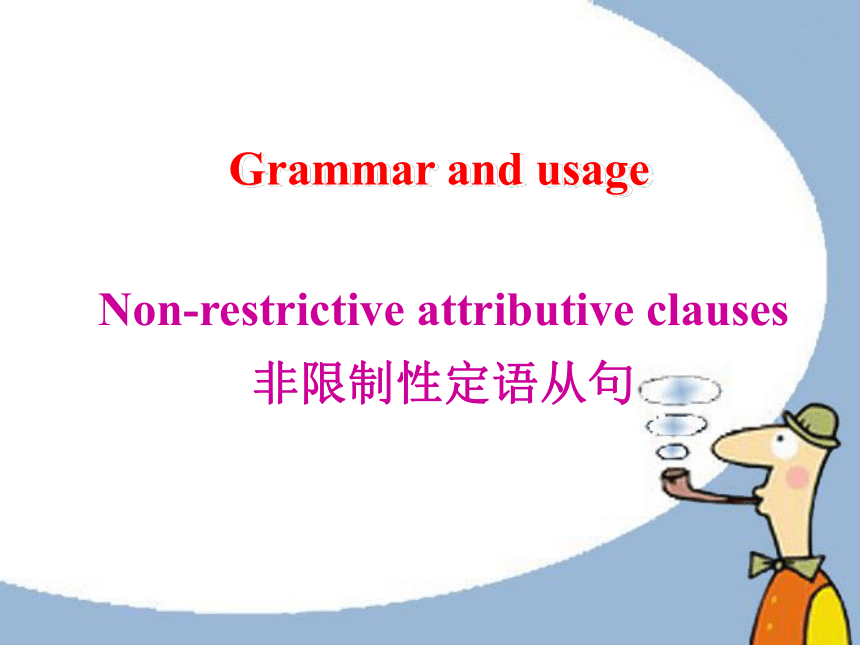
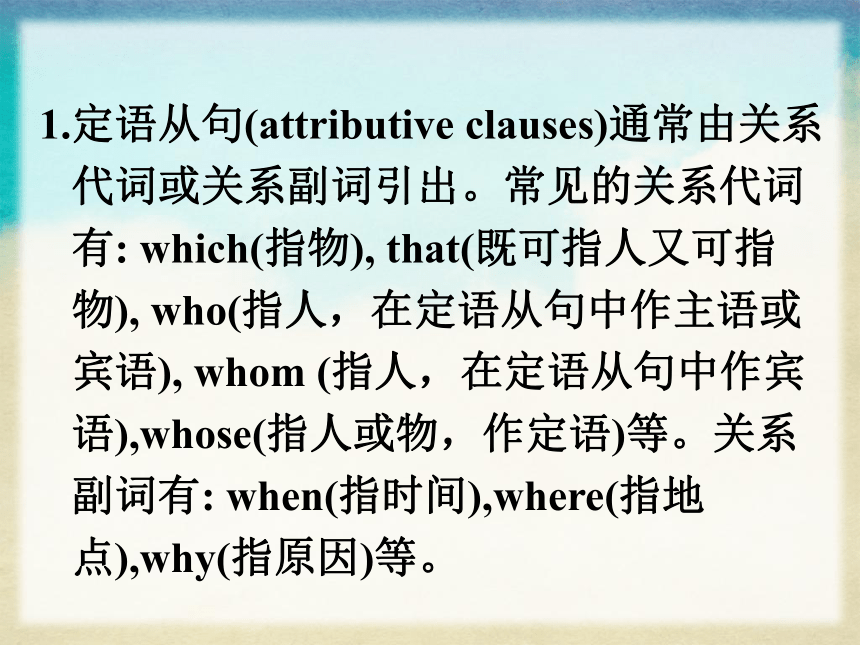
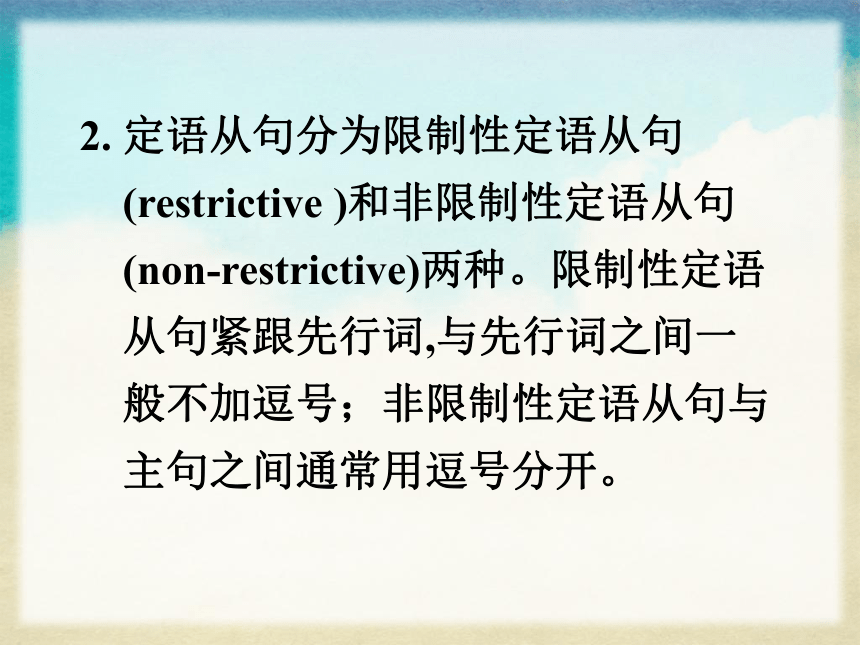
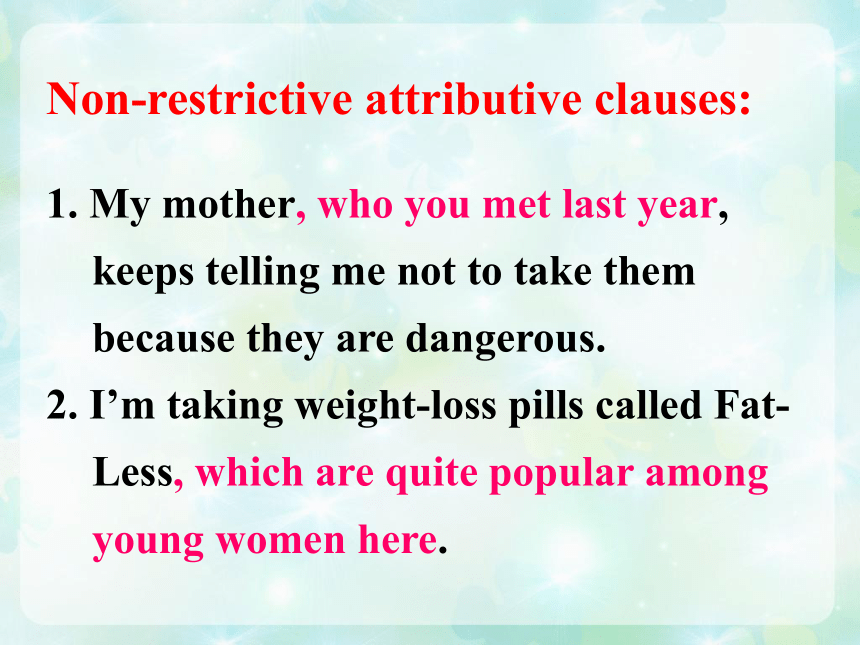

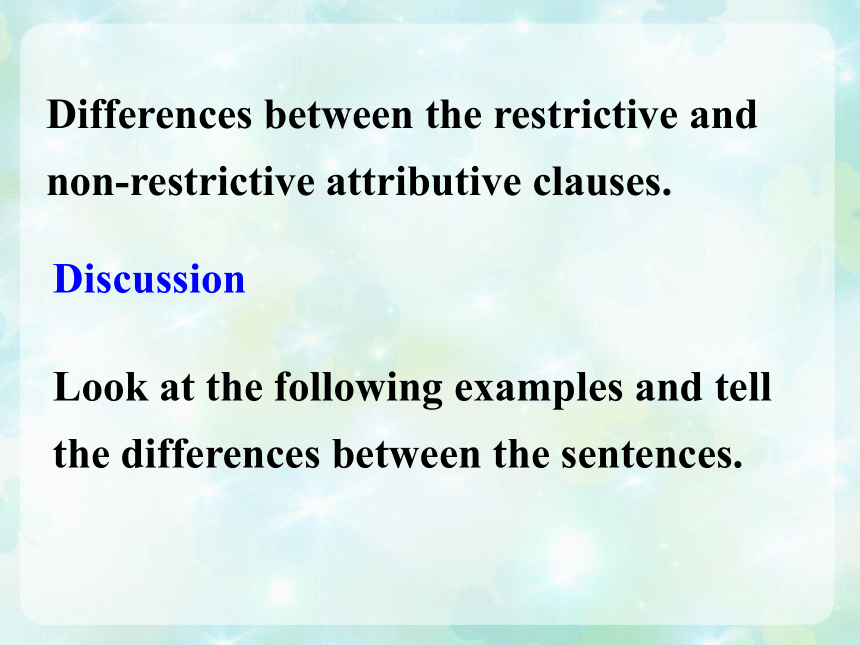
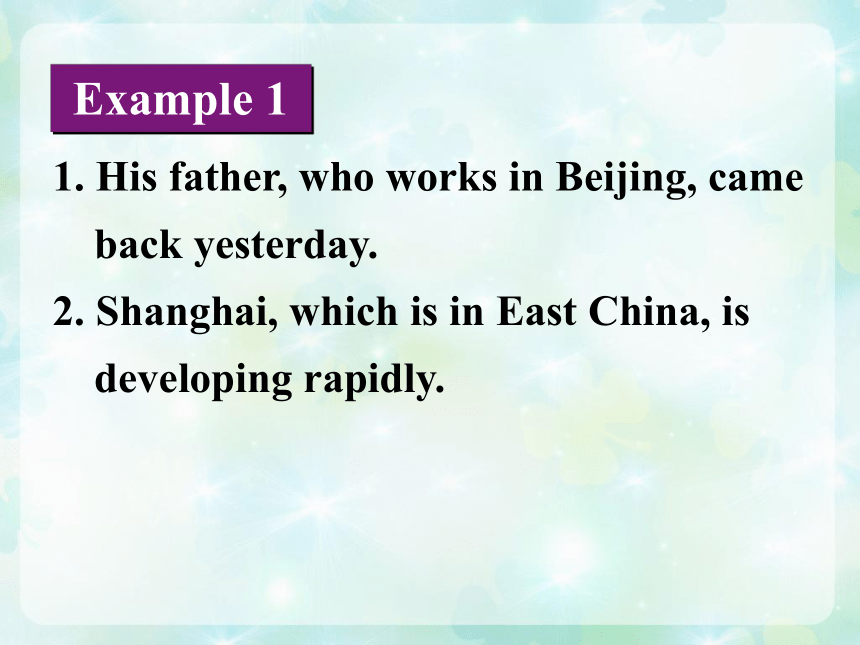
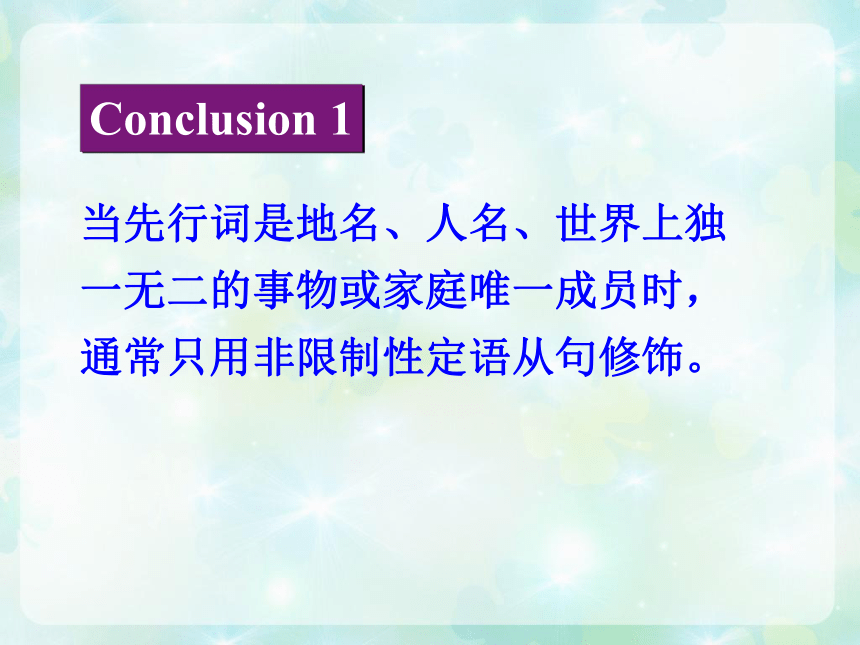
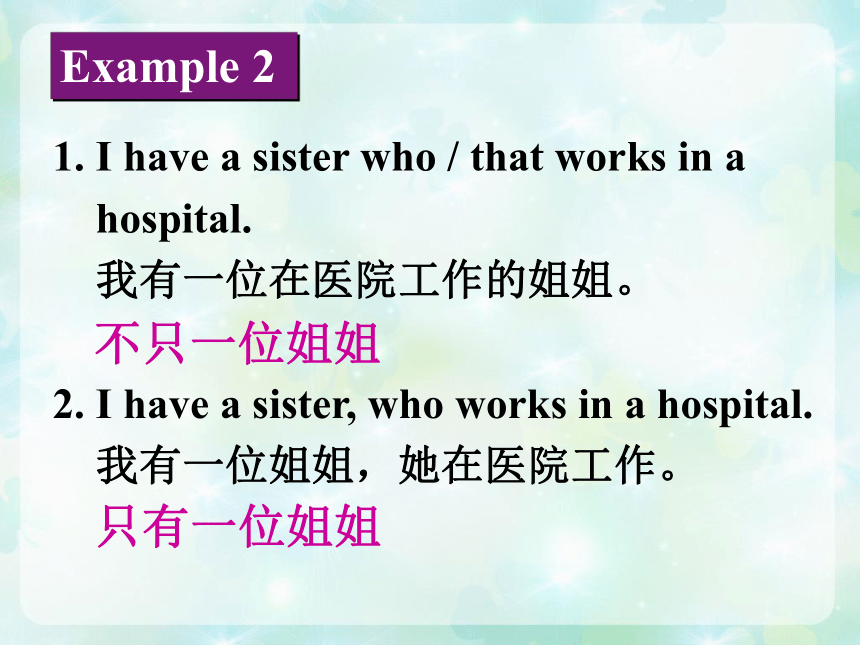
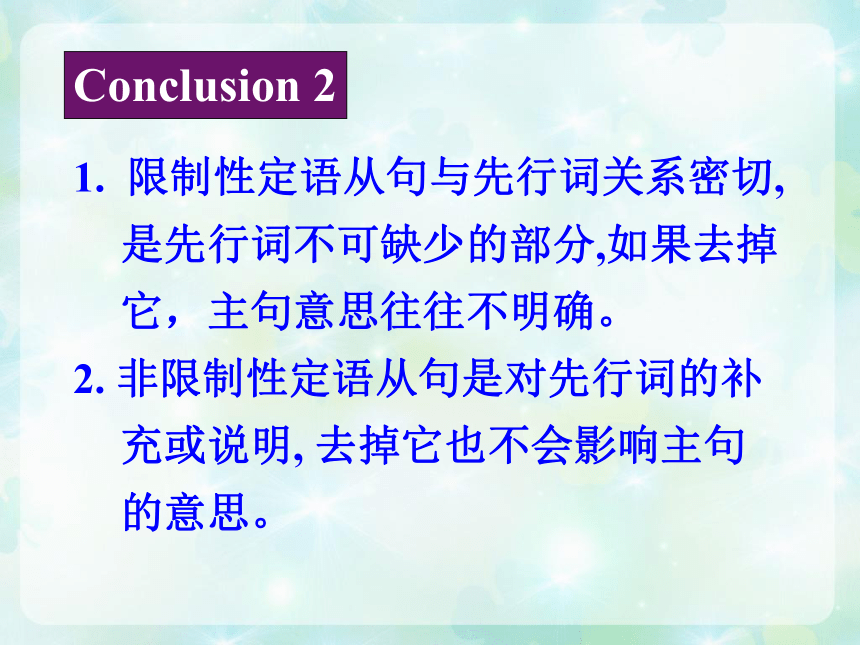
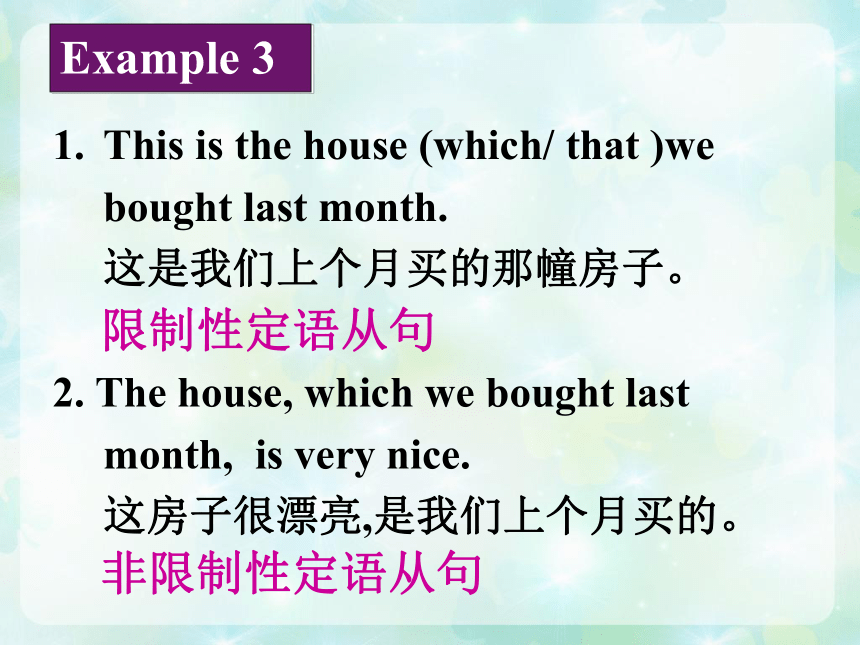
文档简介
课件49张PPT。英语课件牛津版
高一模块一
Unit 3Grammar and usageNon-restrictive attributive clauses
非限制性定语从句1.定语从句(attributive clauses)通常由关系代词或关系副词引出。常见的关系代词有: which(指物), that(既可指人又可指物), who(指人,在定语从句中作主语或宾语), whom (指人,在定语从句中作宾语),whose(指人或物,作定语)等。关系副词有: when(指时间),where(指地点),why(指原因)等。2. 定语从句分为限制性定语从句(restrictive )和非限制性定语从句(non-restrictive)两种。限制性定语从句紧跟先行词,与先行词之间一般不加逗号;非限制性定语从句与主句之间通常用逗号分开。1. My mother, who you met last year, keeps telling me not to take them because they are dangerous.
2. I’m taking weight-loss pills called Fat-Less, which are quite popular among young women here.Non-restrictive attributive clauses:3. My mother insisted on sending me to the hospital, where I received good medical treatment.
4. It’s the same in China—many people, some of whom are not overweight at all, are always going on diet or taking weight-loss pills, which are often dangerous.Differences between the restrictive and non-restrictive attributive clauses.DiscussionLook at the following examples and tell the differences between the sentences.1. His father, who works in Beijing, came back yesterday.
2. Shanghai, which is in East China, is developing rapidly.Example 1Conclusion 1当先行词是地名、人名、世界上独一无二的事物或家庭唯一成员时,通常只用非限制性定语从句修饰。1. I have a sister who / that works in a hospital. 我有一位在医院工作的姐姐。
2. I have a sister, who works in a hospital.我有一位姐姐,她在医院工作。Example 2不只一位姐姐只有一位姐姐Conclusion 21. 限制性定语从句与先行词关系密切,是先行词不可缺少的部分,如果去掉它,主句意思往往不明确。
2. 非限制性定语从句是对先行词的补充或说明, 去掉它也不会影响主句的意思。This is the house (which/ that )we bought last month. 这是我们上个月买的那幢房子。
2. The house, which we bought last month, is very nice. 这房子很漂亮,是我们上个月买的。Example 3限制性定语从句非限制性定语从句Conclusion 31. 限制性定语从句可以由关系代词,关系副词来引导,关系代词作宾语时可以省略。
2. 非限制性定语从句既可修饰先行词,又可修饰整个主句,不可用that引导且关系代词不可以省略。1. The famous basketball star, ___ comes from America, will visit our school soon.
2. In those days, she used to go to Mr black,with _____ she had a wonderful time.
3. I bought a car yesterday, _____ cost me a lot.whichwhomwho Practice4. Xi’an, ______ I visited last year, is a nice old city.
5. He will come to see me next July, _____ he won’t be so busy.
6. The school, _____ I once studied, was built thirty years ago.
whichwherewhen7. John said he’d been working in the office for an hour, _____ was true.
8. __ we all know, he is good at English.Aswhich非限制性定语从句考点归纳:as 和which引导非限制性定语从句, 代替整个主句。1. As everyone knows,China is a country
with a long history. 众所周知,中国是一个历史悠久的国家。Example:2. She is a teacher, as is clear from her manner. 她是个教师, 这一点从她的举止可以清楚地看出。
3. He missed the show, which was really a great pity. 他错过了演出,这真是很大的遗憾。Conclusionas 和which在引导非限制性定语从句时, as和which可代替整个主句。
2.这两个关系代词都可指代主句所表达的整个意思,且在定语从句中都可以作主语和宾语。3. as和which引导非限制性定语从句的不
同之处在于:
(1) as 引导的定语从句可置于句首或主句之后,而which引导的定语从句不可放在句首,只能放在主句之后。
(2) as 代表前面的整个主句并在从句中作主语时,从句中的谓语通常是see,know,
guess,expect等动词,表示‘正如’的意思,而which与主句往往有一种因果关系,表示‘所以’或‘这一点’。 PracticeAlice received an invitation from her boss, _____ came as a surprise.
2. The weather turned out to be very good, _____ was more than we could expect.
3. __ is expected, the England team won the football match.Aswhichwhich4. It rained hard yesterday, _____ prevented me from going to the park.
5. __ we can see, the smoke came from the little dustbin.whichAsII. all / some/ of + whom / which引导非限制性定语从句Example:He has told us many stories, all of which are about the famous Long Match.
2. The students of Class 1, some of whom came from Japan, went camping yesterday.Conclusion 在非限制性定语从句中,一些表达数量或定位的数词或代词如 all/ some/ one/ both/ neither/ none/ any/ either/ any 等可与 of 构成介词词组修饰限制先行词,此时先行词在其后的定语从句中作介词的宾语,关系代词不可用that。如先行词指人则用whom,如先行词指物则用which引导从句。1. Many students in this school, some of which are not overweight, are going on diets.
2. There are 54 students in my class and ten of whom come from US.whomCorrection:them3. Half a million pairs of shoes are produced by the workers here every year, 80% of whom are sold abroad.
4. I have many friends in this town, some of which are businessman.
5. I am doing different types of exercises, all of them are quite helpful to my health.whichwhich 或 all 前加andwhomHelen was much kinder to her youngest son than to the others, ____, of course, made the others envy him.
A. who B. that C. what D. whichPractice time2. The English play, ____ my students acted at the New Year’s party ,was a great success. A. for which B. at which C. in which D. on which3. There were dirty marks on her trousers ____ she had wiped her hands. A. where B. which C. when D. that
4. Great changes have taken place in that school. It is no longer what it was 20 years ago, ____ it was so poorly equipped.
A. when B. which C. what D. that5. The British are not so familiar with different cultures and other ways of doing things, _____ is often the case in other countries. A. it B. that C. as D .so6. Recently I bought an ancient Chinese vase, ____ was very reasonable. A. which price B. the price of which C. its price D. the price of whoseQuestion tags1. Looking good is important to women, isn’t it?
I was lucky, wasn’t I?
We shouldn’t be ashamed of the way we look, should we?ExamplesAll the question tags above are used to ask for agreement by the writer and they should be read in a falling tone.Conclusion:Rules:
陈述部分带有seldom, hardly, never, neither, none, nobody, nothing, few, little 等否定词时,疑问部分应用肯定。
如果陈述部分的否定词仅带否定前缀或后缀,那么,陈述部分做肯定句处理,疑问部分仍用否定形式。e.g. He was unsuccessful, _________?
当陈述部分是以there开头时,疑问 部分主语也用there。
e.g. There is no help for it,________?
There is something wrong, _________?wasn’t heis thereisn’t there如果陈述部分是I am 的结构,疑问部分用aren’t I.
e.g. I am late, ________?
如果陈述部分是一个带有that分句作宾语的主从结构时,疑问部分一般应与主句的主语和谓语动词保持对应关系。aren’t Ie.g. She says that I did it,__________?
注意:当陈述部分的主句是I suppose, I think, I believe 等结构时,疑问部分则往往与that分句中的主语和谓语动词保持对应关系,但要注意否定的转移。
e.g. I supposed that he is serious, ______?
I don’t think that she works hard, ________?doesn’t sheisn’t hedoes she陈述部分含有ought to时,疑问部分可以用ought形式,也可用should形式。
e.g. The child ought to be punished, __________?
We ought to go there, ___________?
陈述部分有used to时,疑问部分可用used形式,也可用did形式。
e.g. He used to smoke five cigarettes a day, ________________?oughtn’t heshouldn’t wedidn’t / usedn’t he陈述部分有had better,would rather,would like时,疑问部分要注意区别简略形式。
e.g. You’d better go now, __________?
You’d rather go there early, ____________?
He’d like to go, _____________?hadn’t youwouldn’t hewouldn’t you当陈述部分主语为this,that,everything,anything,something,nothing等时,反意疑问句的主语用it。
e.g. Everything is all right, ________?
Nothing can stop us now, ________?isn’t itcan it当陈述部分中主语为anybody, anyone, everybody, everyone, somebody, someone, nobody, no one, those, these反意疑问句中主语用they。
e.g. Everyone knows the answer, __________?don’t they在祈使句中
1) 肯定与否定的祈使句中,疑问部分都用will you
e.g. Don’t move the chair, ________?
2) 以let’s开头的祈使句,疑问句部分用shall we
3) 以let us开头的祈使句,疑问句部分用will youwill you感叹句的反意疑问句一律用否定式,疑问部分人称代词与陈述部分一致。
e.g. What a lovely day, ______?
陈述句的主语是不定式,动名词或词组时,反意疑问句的主语应为it。
e.g. Doing morning exercises has helped to improve her health, ________?isn’t ithasn’t it(想喝)-Yes, we will.(不想喝)-No, we won’t.(他能)(他不能)-Yes, he can.-No, he can’t.反意疑问句的回答方式与一般疑问句一
样,肯定回答用yes,否定回答用no。
e.g. –Neither of us will have coffee, will you? -His father can’t name the plant, can he?Sarah had her washing machine repaired the day before yesterday, ___ she? (2006 广东)
A. had B. did
C. hadn’t D. didn’t高考链接解析:肯定性陈述句中的had是表示“让……”的实义动词,其反义疑问句应用didn’t的形式。2. I’m sure you’d rather she went to school by bus, ______? (2006 福建)
A. hadn’t you B. wouldn’t you
C. aren’t you D. didn’t she
解析: I’m sure 属于第一人称所持某种见解的结构,应根据其后的宾语从句确定反义疑问句的形式。3. When you’ve finished with that book, don’t forget to put it back on the shelf, _______? (2007 北京)
A. do you B. don’t you
C. will you D. won’t you解析:题干中主句为否定祈使句,只能用will you引导其后面对饿反义疑问句。1. Go over the question tags.
2. Finish Part A and B on P51 in your textbook as well as Part C2 on P96 in your workbook.
3. Preview Task.Homework
高一模块一
Unit 3Grammar and usageNon-restrictive attributive clauses
非限制性定语从句1.定语从句(attributive clauses)通常由关系代词或关系副词引出。常见的关系代词有: which(指物), that(既可指人又可指物), who(指人,在定语从句中作主语或宾语), whom (指人,在定语从句中作宾语),whose(指人或物,作定语)等。关系副词有: when(指时间),where(指地点),why(指原因)等。2. 定语从句分为限制性定语从句(restrictive )和非限制性定语从句(non-restrictive)两种。限制性定语从句紧跟先行词,与先行词之间一般不加逗号;非限制性定语从句与主句之间通常用逗号分开。1. My mother, who you met last year, keeps telling me not to take them because they are dangerous.
2. I’m taking weight-loss pills called Fat-Less, which are quite popular among young women here.Non-restrictive attributive clauses:3. My mother insisted on sending me to the hospital, where I received good medical treatment.
4. It’s the same in China—many people, some of whom are not overweight at all, are always going on diet or taking weight-loss pills, which are often dangerous.Differences between the restrictive and non-restrictive attributive clauses.DiscussionLook at the following examples and tell the differences between the sentences.1. His father, who works in Beijing, came back yesterday.
2. Shanghai, which is in East China, is developing rapidly.Example 1Conclusion 1当先行词是地名、人名、世界上独一无二的事物或家庭唯一成员时,通常只用非限制性定语从句修饰。1. I have a sister who / that works in a hospital. 我有一位在医院工作的姐姐。
2. I have a sister, who works in a hospital.我有一位姐姐,她在医院工作。Example 2不只一位姐姐只有一位姐姐Conclusion 21. 限制性定语从句与先行词关系密切,是先行词不可缺少的部分,如果去掉它,主句意思往往不明确。
2. 非限制性定语从句是对先行词的补充或说明, 去掉它也不会影响主句的意思。This is the house (which/ that )we bought last month. 这是我们上个月买的那幢房子。
2. The house, which we bought last month, is very nice. 这房子很漂亮,是我们上个月买的。Example 3限制性定语从句非限制性定语从句Conclusion 31. 限制性定语从句可以由关系代词,关系副词来引导,关系代词作宾语时可以省略。
2. 非限制性定语从句既可修饰先行词,又可修饰整个主句,不可用that引导且关系代词不可以省略。1. The famous basketball star, ___ comes from America, will visit our school soon.
2. In those days, she used to go to Mr black,with _____ she had a wonderful time.
3. I bought a car yesterday, _____ cost me a lot.whichwhomwho Practice4. Xi’an, ______ I visited last year, is a nice old city.
5. He will come to see me next July, _____ he won’t be so busy.
6. The school, _____ I once studied, was built thirty years ago.
whichwherewhen7. John said he’d been working in the office for an hour, _____ was true.
8. __ we all know, he is good at English.Aswhich非限制性定语从句考点归纳:as 和which引导非限制性定语从句, 代替整个主句。1. As everyone knows,China is a country
with a long history. 众所周知,中国是一个历史悠久的国家。Example:2. She is a teacher, as is clear from her manner. 她是个教师, 这一点从她的举止可以清楚地看出。
3. He missed the show, which was really a great pity. 他错过了演出,这真是很大的遗憾。Conclusionas 和which在引导非限制性定语从句时, as和which可代替整个主句。
2.这两个关系代词都可指代主句所表达的整个意思,且在定语从句中都可以作主语和宾语。3. as和which引导非限制性定语从句的不
同之处在于:
(1) as 引导的定语从句可置于句首或主句之后,而which引导的定语从句不可放在句首,只能放在主句之后。
(2) as 代表前面的整个主句并在从句中作主语时,从句中的谓语通常是see,know,
guess,expect等动词,表示‘正如’的意思,而which与主句往往有一种因果关系,表示‘所以’或‘这一点’。 PracticeAlice received an invitation from her boss, _____ came as a surprise.
2. The weather turned out to be very good, _____ was more than we could expect.
3. __ is expected, the England team won the football match.Aswhichwhich4. It rained hard yesterday, _____ prevented me from going to the park.
5. __ we can see, the smoke came from the little dustbin.whichAsII. all / some/ of + whom / which引导非限制性定语从句Example:He has told us many stories, all of which are about the famous Long Match.
2. The students of Class 1, some of whom came from Japan, went camping yesterday.Conclusion 在非限制性定语从句中,一些表达数量或定位的数词或代词如 all/ some/ one/ both/ neither/ none/ any/ either/ any 等可与 of 构成介词词组修饰限制先行词,此时先行词在其后的定语从句中作介词的宾语,关系代词不可用that。如先行词指人则用whom,如先行词指物则用which引导从句。1. Many students in this school, some of which are not overweight, are going on diets.
2. There are 54 students in my class and ten of whom come from US.whomCorrection:them3. Half a million pairs of shoes are produced by the workers here every year, 80% of whom are sold abroad.
4. I have many friends in this town, some of which are businessman.
5. I am doing different types of exercises, all of them are quite helpful to my health.whichwhich 或 all 前加andwhomHelen was much kinder to her youngest son than to the others, ____, of course, made the others envy him.
A. who B. that C. what D. whichPractice time2. The English play, ____ my students acted at the New Year’s party ,was a great success. A. for which B. at which C. in which D. on which3. There were dirty marks on her trousers ____ she had wiped her hands. A. where B. which C. when D. that
4. Great changes have taken place in that school. It is no longer what it was 20 years ago, ____ it was so poorly equipped.
A. when B. which C. what D. that5. The British are not so familiar with different cultures and other ways of doing things, _____ is often the case in other countries. A. it B. that C. as D .so6. Recently I bought an ancient Chinese vase, ____ was very reasonable. A. which price B. the price of which C. its price D. the price of whoseQuestion tags1. Looking good is important to women, isn’t it?
I was lucky, wasn’t I?
We shouldn’t be ashamed of the way we look, should we?ExamplesAll the question tags above are used to ask for agreement by the writer and they should be read in a falling tone.Conclusion:Rules:
陈述部分带有seldom, hardly, never, neither, none, nobody, nothing, few, little 等否定词时,疑问部分应用肯定。
如果陈述部分的否定词仅带否定前缀或后缀,那么,陈述部分做肯定句处理,疑问部分仍用否定形式。e.g. He was unsuccessful, _________?
当陈述部分是以there开头时,疑问 部分主语也用there。
e.g. There is no help for it,________?
There is something wrong, _________?wasn’t heis thereisn’t there如果陈述部分是I am 的结构,疑问部分用aren’t I.
e.g. I am late, ________?
如果陈述部分是一个带有that分句作宾语的主从结构时,疑问部分一般应与主句的主语和谓语动词保持对应关系。aren’t Ie.g. She says that I did it,__________?
注意:当陈述部分的主句是I suppose, I think, I believe 等结构时,疑问部分则往往与that分句中的主语和谓语动词保持对应关系,但要注意否定的转移。
e.g. I supposed that he is serious, ______?
I don’t think that she works hard, ________?doesn’t sheisn’t hedoes she陈述部分含有ought to时,疑问部分可以用ought形式,也可用should形式。
e.g. The child ought to be punished, __________?
We ought to go there, ___________?
陈述部分有used to时,疑问部分可用used形式,也可用did形式。
e.g. He used to smoke five cigarettes a day, ________________?oughtn’t heshouldn’t wedidn’t / usedn’t he陈述部分有had better,would rather,would like时,疑问部分要注意区别简略形式。
e.g. You’d better go now, __________?
You’d rather go there early, ____________?
He’d like to go, _____________?hadn’t youwouldn’t hewouldn’t you当陈述部分主语为this,that,everything,anything,something,nothing等时,反意疑问句的主语用it。
e.g. Everything is all right, ________?
Nothing can stop us now, ________?isn’t itcan it当陈述部分中主语为anybody, anyone, everybody, everyone, somebody, someone, nobody, no one, those, these反意疑问句中主语用they。
e.g. Everyone knows the answer, __________?don’t they在祈使句中
1) 肯定与否定的祈使句中,疑问部分都用will you
e.g. Don’t move the chair, ________?
2) 以let’s开头的祈使句,疑问句部分用shall we
3) 以let us开头的祈使句,疑问句部分用will youwill you感叹句的反意疑问句一律用否定式,疑问部分人称代词与陈述部分一致。
e.g. What a lovely day, ______?
陈述句的主语是不定式,动名词或词组时,反意疑问句的主语应为it。
e.g. Doing morning exercises has helped to improve her health, ________?isn’t ithasn’t it(想喝)-Yes, we will.(不想喝)-No, we won’t.(他能)(他不能)-Yes, he can.-No, he can’t.反意疑问句的回答方式与一般疑问句一
样,肯定回答用yes,否定回答用no。
e.g. –Neither of us will have coffee, will you? -His father can’t name the plant, can he?Sarah had her washing machine repaired the day before yesterday, ___ she? (2006 广东)
A. had B. did
C. hadn’t D. didn’t高考链接解析:肯定性陈述句中的had是表示“让……”的实义动词,其反义疑问句应用didn’t的形式。2. I’m sure you’d rather she went to school by bus, ______? (2006 福建)
A. hadn’t you B. wouldn’t you
C. aren’t you D. didn’t she
解析: I’m sure 属于第一人称所持某种见解的结构,应根据其后的宾语从句确定反义疑问句的形式。3. When you’ve finished with that book, don’t forget to put it back on the shelf, _______? (2007 北京)
A. do you B. don’t you
C. will you D. won’t you解析:题干中主句为否定祈使句,只能用will you引导其后面对饿反义疑问句。1. Go over the question tags.
2. Finish Part A and B on P51 in your textbook as well as Part C2 on P96 in your workbook.
3. Preview Task.Homework
